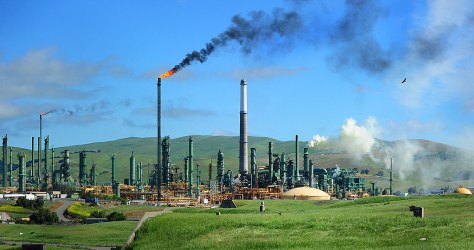
Benicia Fire Department on Facebook, March 6, 2023, around noon. (Also posted on City of Benicia Nextdoor.)

Benicia Fire Department on Facebook, March 6, 2023, around noon. (Also posted on City of Benicia Nextdoor.)

At the global climate talks in Glasgow, Scotland, Seattle Mayor Jenny Durkan announced policies she says will take a big bite out of Seattle’s climate-harming emissions from buildings and cars.
“We are really working toward urgent action on climate change,” Durkan said.
She proposes requiring large buildings to clean up their carbon acts, starting in five years.
Her executive order seeks to make existing commercial and multifamily buildings convert to clean electric power and eliminate the use of fossil fuels no later than 2050. Initial emission reductions would begin by 2026.
Seattle has mandated climate-friendliness in new construction but to date has done much less to tackle the bigger problem: the impacts of existing buildings.
The proposed policy would cut building-based emissions in the city 39% by 2030 and eliminate them by 2050, according to Durkan.

Monday’s executive order directs city staff to engage with community groups and draft legislation for performance standards for large buildings by next July, six months after Durkan’s term has ended. Then the Seattle City Council would have its say.
Of course, public process is often where proposals go to die in Seattle, like one Durkan touted in 2018 for downtown tolling, which she dropped in 2020.
Other proposals announced by Durkan Monday include:
“This provides safe, reliable, and affordable trips for families,” Alex Hudson with the Transportation Choice Coalition said at the mayor’s press conference. “Transportation is the single largest contributor to greenhouse gas emissions as well as the air pollutants that affect public health and increased rates of asthma and other public health emergencies.”
“The city of Seattle is leading America in all of our efforts,” Durkan said, echoing a claim Seattle mayors have made for nearly 20 years.
Following similar bans in Oakland, San Francisco, San Jose, and other California cities in 2019 and 2020, Seattle banned most natural gas use in new construction of large buildings in February 2021.
State law prohibits Washington cities from banning fossil fuel use or imposing tighter energy codes on residential buildings less than four stories tall.
“Three cities (Washington D.C., New York, and St. Louis) and Washington state have already passed legislation creating building performance standards,” trade publication FacilitiesNet.com reports.
Seattle’s Green New Deal law requires the city to aim for zero climate pollution by 2030, not 2050, as Durkan’s policies do.
“I thank [the Seattle City] Council for what they passed in terms of some of the targets they want to meet, but targets mean nothing unless we have a cohesive plan,” Durkan said.
“Zero emissions by 2030 is the proper goal, and what the City committed to in 2019,” climate activist Jess Wallach with 350 Seattle said in an email.
“Actually leading the nation would look like doing more than taking four years to make an underwhelming promise with no real targets or accountability,” Wallach said.
Durkan’s proposed 2022 city budget devotes much less money to curbing fossil fuels than activists have called for. It includes $1.7 million to convert 125 low-income households from oil heat to electric heat pumps. The “solidarity budget” pushed by progressive activist groups calls for $85 million annually over three years, enough to convert all oil-heated low-income homes in the city to clean energy.
Both candidates for Seattle mayor, Lorena González and Bruce Harrell, one of whom will replace Durkan in January, have signed a climate pledge to reduce the city’s greenhouse gas emissions 58% by 2030 and eliminate them by 2050.

The historic storm yesterday saw the City staff make a number of critical decisions that saved the possible failure of an aging lift station in the Industrial Park. Had that station failed, significant amounts of raw sewage would have been released into the Strait and the City would likely have faced very large fines. Besides the quick and decisive action by the Public Works Utility staff, a huge thank you to Ponder Environmental for loaning the City some large tanks to help out when most needed.
In addition, the huge amount of water flowing into Lake Herman threatened to reach the spillway in an uncontrolled release, which could have caused flooding into the Industrial Park and elsewhere. The decision was made to fully open the release valve and divert the water into Sulphur Springs creek. By doing so, we were able to release water as fast as it was coming in.
We all owe our gratitude to the City workers, including Fire and Police, who worked through the night to protect our community.
COVID Mass Vaccine Clinics |
| Solano County Public Health announces mass vaccination clinics now operating Wednesday-Saturday from 9 a.m. – 4 p.m. at Solano County Fairgrounds. Clinics are expected to be operational for a total of 8 weeks, until mid-December, with closures the week of November 3 – 6 and again November 24 – 27 for the Thanksgiving Holiday.
To make an appointment for the vaccination clinic, eligible residents can sign up to for their Pfizer booster or their first/second dose with the Pfizer vaccine online at https://vax.phast-vax-ca.org/en-US/. Details on Moderna booster vaccines will be available soon. Those requiring registration assistance may call 800.672.0150. |

MORE COVID ASSISTANCE: CITY OF BENICIA THIS WEEK NEWSLETTER
You must be logged in to post a comment.